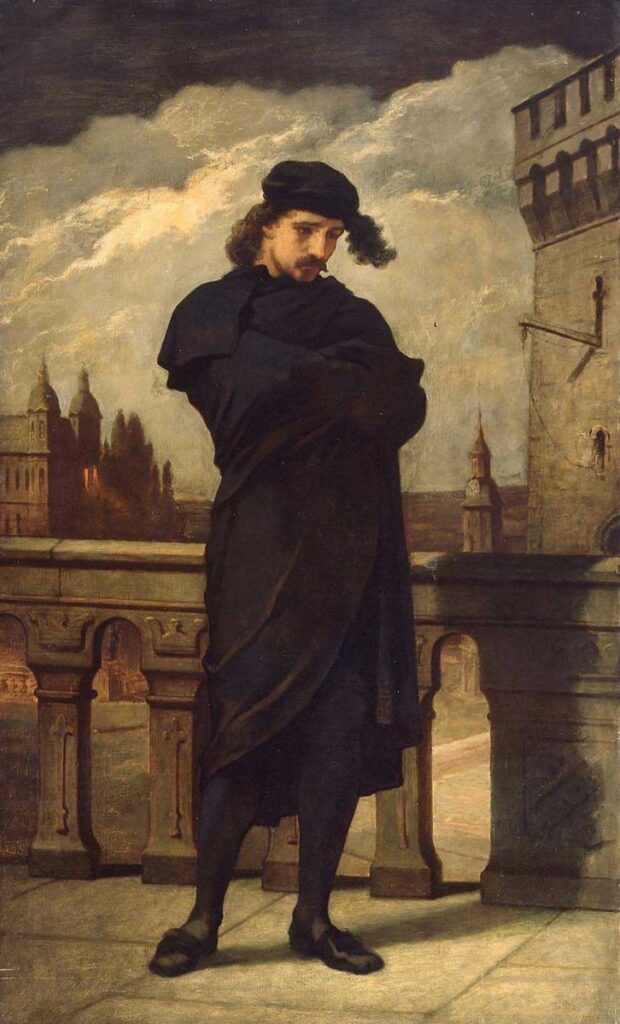Wednesday
Yale history professor Timothy Snyder recently reported Ukrainian president Volodymyr Zelensky citing Shakespeare’s best-known line to describe his country’s current situation: “To be or not to be.” While Zelensky is not, like Hamlet, contemplating suicide, Snyder notes the quote “is certainly a propos right now.”
Hamlet’s line comes in the third act when he is still reeling from all that has happened when he’s been away at college. His father has died and, without taking any time to properly grieve, his mother has married his uncle. (“The funeral baked meats did coldly furnish forth the marriage tables,” Hamlet remarks to Horatio.) If, as I have argued, Hamlet is in large part a drama about grieving, then it stands to reason that the prince would be obsessed with death. In some ways, he muses, the only thing that prevents us from killing ourselves is fear of what may lie in wait hereafter:
Who would fardels bear,
To grunt and sweat under a weary life,
But that the dread of something after death,
The undiscovered country from whose bourn
No traveler returns, puzzles the will
And makes us rather bear those ills we have
Than fly to others that we know not of?
Ukraine is certainly bearing its share of fardels, along with
the whips and scorns of time,
Th’ oppressor’s wrong, the proud man’s contumely [insolence],
…the law’s delay,
The insolence of office…
It also has little doubt about the horrors it will experience if it loses. Surrender, which is what Donald Trump, J.D. Vance, Viktor Orban, and Putin lovers throughout the world would like to see, is tantamount to suicide. As Snyder notes, the Russians “have made clear, over and over, that their goal is the humiliation and the destruction of Ukraine as a first step towards a world order in which such actions are normal.” Ukraine as an independent nation would cease “to be.” No wonder Zelensky turns to Hamlet’s stark choice to capture his situation.
Snyder says that negotiating a peace at this stage in the war will not work because “one cannot simply choose to negotiate with a power that openly seeks to bring about the end of your nation and state.” Ukraine’s only hope is to show that Russia’s attempts at destruction will end in failure. For this, it needs more help from America and the allies, who must reinforce their prior help and further supplement it. With such help, Snyder believes, Ukraine has a good chance of delivering that message.
Although Russia has been suffering unimaginable losses, however, there is one area in which it has been successful: Snyder says that it has been able to get inside America’s head. Putin’s threats of a broader conflict, the historian believes, has prompted us to slow the delivery of needed weapons and to put constraints on Ukraine’s actions (including penetrating Russian territory). Only recently have some of these been lifted. We could say of America and its allies, to take Hamlet’s words slightly out of context,
Thus conscience does make cowards of us all,
And thus the native hue of resolution
Is sicklied o’er with the pale cast of thought,
And enterprises of great pitch and moment
With this regard their currents turn awry
And lose the name of action…
It is worth noting that, after delivering his speech, Hamlet stops ruminating and swings into action. He exposes the crime of his uncle, accidentally kills Polonius (so okay, not all action is good action), escapes Claudius’s murder plot, and, clear-eyed at last, returns to Denmark to “set things right.” Snyder is challenging the Biden administration to behave similarly, casting off any “pale cast of thought” and committing itself to this enterprise of great pitch and moment. After all, in the play’s finale the murderous tyrant is brought low.
To be sure, Hamlet himself dies in the process, but that’s not a risk that the U.S faces, having committed no troops. Zelensky, on the other hand, has shown himself more than willing to make such a tradeoff, having refused to leave the country when Russia invaded. “I need ammunition, not a ride,” he memorably told the world.
Zelensky is actually less Hamlet and more Henry V, who tells his troops,
Once more unto the breach, dear friends;
Or close the wall up with our English dead.


